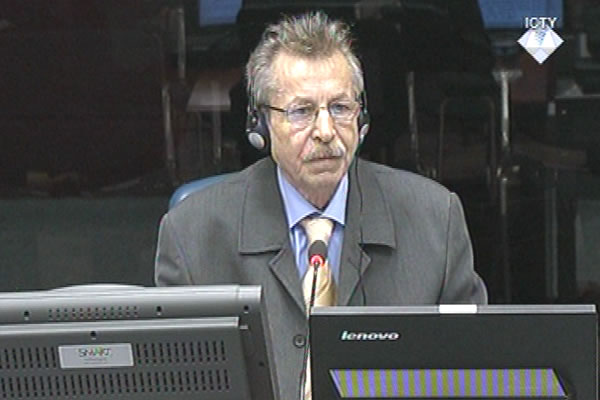Home
MAKING MUSLIMS FEEL LIKE THEY LIVED ‘IN A GHETTO’
In his evidence in Ratko Mladic’s defense, Colonel Rajko Sarenac claimed that his 1st Guards Brigade was engaged in combat but that it did not attack civilians. Sarenac’s claim prompted the prosecutor to show documents produced by the VRS Mains Staff which order the subordinate units to make the Muslim population feel like they ‘live in a ghetto’ and to ‘make it possible for them to move out’
 Rajko Sarenac, defence witness at Rako Mladic trial
Rajko Sarenac, defence witness at Rako Mladic trial Colonel Rajko Sarenac was an assistant for moral guidance to the commander of the 1st Guards Brigade. The unit was directly subordinated to the Bosnian Serb Army Main Staff and its commander, the accused Ratko Mladic. The brigade didn’t have a permanent place of deployment; it was dispatched to various parts of the front line as needed, mostly around Sarajevo and in Podrinje in Eastern Bosnia.
In his statement to the defense and in the examination-in-chief, the emphasis was on the deployment of the witness’s unit in the Nisici plateau in late 1993. In a clash with the BH Army, the unit allowed the Croat soldiers and civilians to withdraw from Vares to Kiseljak. In July 1993, the witness noted, he entered Trnovo side by side with General Mladic. According to the witness, the accused ordered his troops to make sure that nothing bad happened to the local police commander because he had saved Mladic’s uncle and aunt from Trnovo.
In the cross-examination, prosecutor Weber mostly dealt with the deployment of the witness’s brigade in the clashes in Eastern Bosnia in the spring of 1993,in a bid to prove that the goal of the Bosnian Serb army – apart from attacking the BH Army positions – was to expel civilians from Cerska, Zepa, Gorazde and other places in Podrinje. Asked about that, the witness replied that his unit fought against the enemy. If any civilians got in the way, ‘it was their problem’, the witness explained.
Vinko Pandurevic, commander of the Zvornik Brigade, said in a combat report in March 1993 that ‘all available means’ were used against the column of Muslim civilians and soldiers moving from Konjevic Polje. Thought he admitted that his unit operated together with the Zvornik Brigade, the witness distanced himself from the report, saying that the two brigades had separate areas of responsibility.
Two orders were issued to all units participating in the operation to seize Podrinje in May 1993. One was to attack Zepa and the other was to attack Gorazde. Both orders state that when the Serb army enter the enclaves, Muslims civilians should be ‘allowed to evacuate’ to Central Bosnia. Sarenac admitted that those orders did arrive in his brigade’s command. However, the attacks on Zepa and Gorazde were repelled, and it was a moot point how the civilians would have been treated had the Serb troops managed to enter those areas.
The prosecutor stressed that a report of the VRS Main Staff dated 30 May 1993 states that the fighting in the Drina River Valley instilled fear in ‘the Muslim troops and population’. The operations should be stopped because of the public pressure, while at the same time the ‘Muslims should be prevented from returning to the villages and towns they had abandoned'. As for those who remained in the enclaves, they should be made to feel as if they lived 'in a ghetto' with their fate 'depending on the Republika Srpska Army’. According to an analysis put forth by the Main Staff, this should lead to further ‘gradual evacuation of the Muslim population’. Those who had already left should be prevented from returning.
The witness replied that everyone was afraid of war. It was normal for the civilians to be afraid because of the fighting, the witness explained. However, the witness denied that the goal of the Bosnian Serb army was to expel Muslim population. Also, the witness claimed that he knew nothing about the claim made in the Main Staff report that the combat operations in Eastern Bosnia were part of the effort to implement one of the six strategic goals of the Bosnian Serbs to abolish the border with Serbia on the Drina River.
Linked Reports
- Case : Mladic
- 2014-11-18 ARKAN AND ‘ARKAN’S MEN’ ARE RESPONSIBLE
- 2014-11-17 KARADZIC’S ‘BIOLOGICAL ANALOGIES’
- 2014-11-13 ‘IGNORANT TYPIST’ MADE A MISTAKE
- 2014-11-20 MLADIC’S WITNESS: MASSACRE IN VELAGICI ‘REVENGE FOR WORLD WAR II’
- 2014-11-24 WITNESS: THERE WERE NO CRIMES IN SUSICA
- 2014-11-24 ‘SILK ROPE FOR ALIJA’
